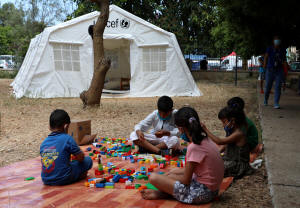|
Lebanon, with a population of 6 million, is at a low point in a
two-year financial meltdown, with a lack of fuel oil and
gasoline meaning extensive blackouts and long lines at the few
gas stations still operating.
"Vital facilities such as hospitals and health centres have been
without access to safe water due to electricity shortages,
putting lives at risk," UNICEF Executive Director Henrietta Fore
said in a statement.
"If four million people are forced to resort to unsafe and
costly sources of water, public health and hygiene will be
compromised, and Lebanon could see an increase in waterborne
diseases, in addition to the surge in COVID-19 cases," she said,
urging the formation of a new government to tackle the crisis.
(Reporting by Nafisa Eltahir; Editing by Frances Kerry)
[© 2021 Thomson Reuters. All rights
reserved.] Copyright 2021 Reuters. All rights reserved. This material may not be published,
broadcast, rewritten or redistributed.
Thompson Reuters is solely responsible for this content.

|
|




